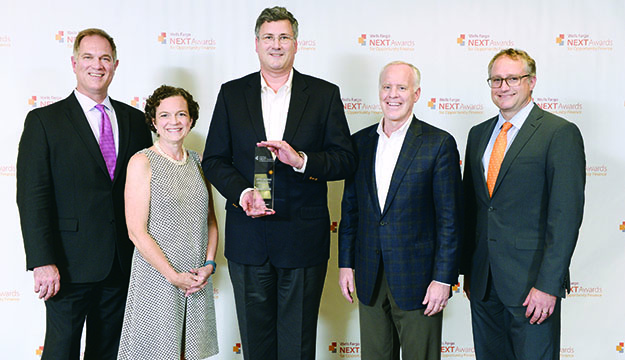Photo Above: Fran Lutz, Interim CEO, Opportunity Finance Network; Allison Clark, Associate Director, Program Related Investments, MacArthur Foundation; Ron Scott, President & CEO, ACFCU; Mike Rizer, Executive Vice President and Director, Community Relations at Wells Fargo Bank; Tony Berkley, Vice President, Strategy & Impact, Prudential Financial, Inc.
By Jeff Keeling
Appalachian Community Federal Credit Union (ACFCU) has won an award that will allow it to bolster its lending by more than 25 percent and also bring “virtual teller machines” to three underserved Appalachian counties.
ACFCU, which is headquartered in Gray, is one of only two credit unions nationwide this year to have won $2 million from the Wells Fargo NEXT Awards for Opportunity Finance for its innovative strategy to expand the credit union’s services in central Appalachia. Of that total, $300,000 is a grant ACFCU will use to place virtual teller machines in three isolated Kentucky counties.
The remainder of the award is a $1.7 million loan from Wells Fargo. Because it is a designated Community Development Financial Institution (CDFI), the credit union was eligible to apply for the NEXT award. To become a CDFI, a private financial institution must demonstrate its commitment to bringing responsible, affordable lending to help low-income, low-wealth and other disadvantaged communities and people join the economic mainstream.
“We set out to reinvent ourselves over five years ago to focus on the underserved, and this award validates the success of that refocusing,” ACFCU CEO Ron Scott said.
The grant award will fund the hardware and software for the virtual teller machines, which will be placed in Owsley and Jackson County and Whitesburg, Ky. Tellers, and eventually loan officers and other credit union staff, will perform normal credit union functions from a center in Gray. The machines should go live by early 2017.
As for the capital injection by Wells Fargo, it will allow ACFCU to leverage it into up to $17 million in loans to customers throughout the credit union’s service area. More than 90 percent of its current borrowers – the credit union made $60.2 million of loans in 2015 – are considered underserved.
“Wells Fargo is giving us more tools to achieve our mission,” Scott said, adding that the large national bank’s risk of that capital should be a safe one.
“We do a tremendous amount of financial coaching and we use a stairstep approach,” Scott said. “We don’t move people faster than they’re capable of going, and that’s really worked. The proof is that our delinquency rate is under 1 percent and our chargeoffs are under 1 percent.”
Scott said those figures are a little higher than the average for credit unions, “but for CDFIs we’re significantly lower.”
Scott said virtual teller technology has been around for a few years, and that many financial institutions see it as a more cost-effective way to serve customers who aren’t necessarily in underserved or economically distressed areas. ACFCU will approach its deployment of the technology differently, but may expand its use to other areas, including Roan Mountain and Mountain City in Tennessee, if this initial experiment proves successful.
The award is granted by the Opportunity Finance Network (OFN), one of the nation’s leading CDFI networks.
“Never before has it been more necessary for CDFIs to embrace fintech, explore new distribution models, and develop leading-edge, responsible financial products,” said Fran Lutz, interim president and CEO of OFN.
“ACFCU’s innovative consumer finance strategy proves that community lenders are the next frontier for innovation in responsible consumer finance.”
OFN presents the NEXT Awards in partnership with Wells Fargo and Prudential and support from the John D. And Catherine T. MacArthur Foundation and the Kresge Foundation.




